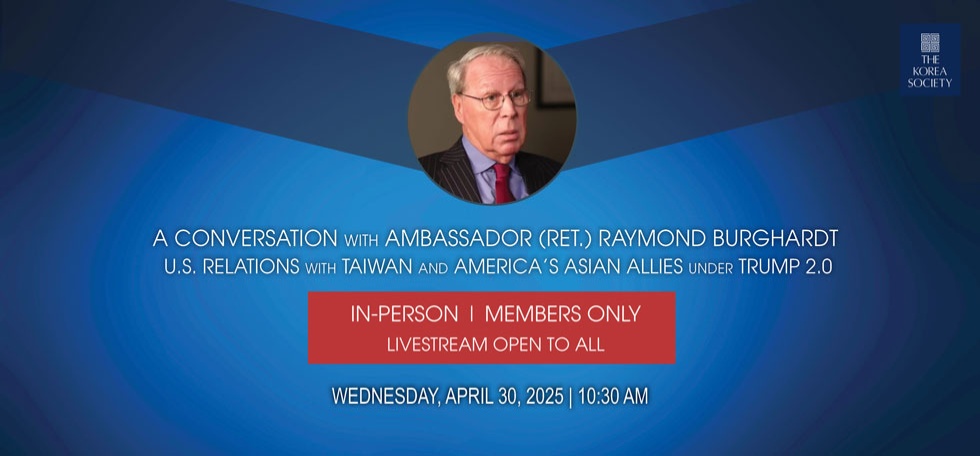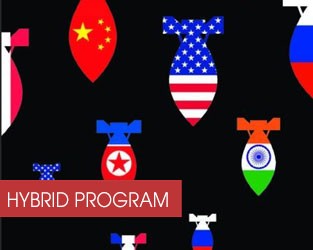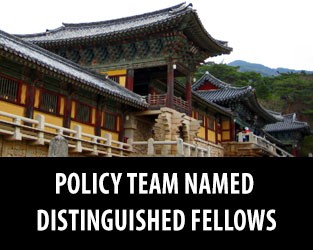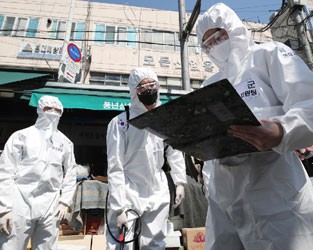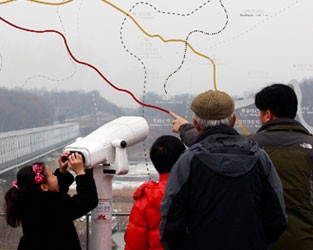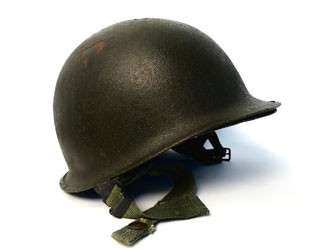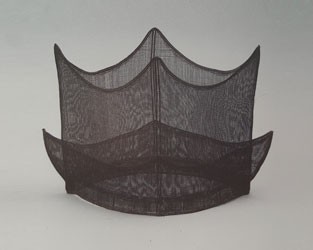![]()
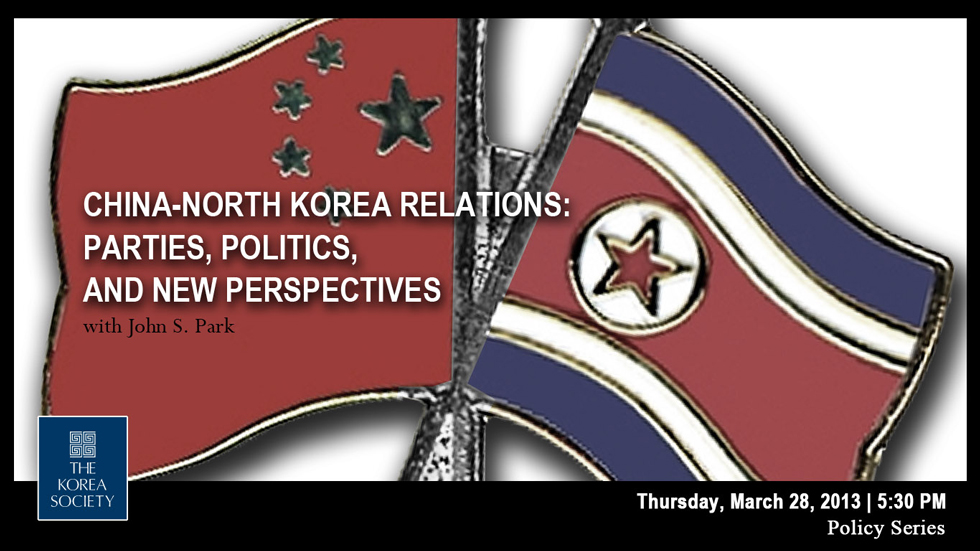
John S. Park, an associate at Harvard Univerty’s Belfer Center for Science and International Affairs and MIT faculty fellow, speaks to progress and new developments in the relations between the DPRK and PRC. Dr. Park speaks to upticks in party relations, Kim Jong Un’s leadership and ties to China’s new leaders, growth in trade with and Chinese-style special economic zones in North Korea, and other changes.
STEPHEN NOERPER (Moderator):
Welcome to Studio Korea and welcome to The Korea Society. I am Senior Vice President Stephen Noerper. Our guests today include foreign policy specialists, friends of Korea, and C-SPAN viewers. We’re delighted to be talking about the very timely topic of North Korea-China relations. To help guide us in that discussion is John Park. John is the MIT Stanton Junior Faculty Fellow. He is also an associate with the Belfer Center of Harvard University's Kennedy School. John is here today to guide us in a discussion on some very pressing issues. We know there has been resounding rhetoric out of Pyongyang that has greatly concerned the international community. We're going to begin by asking John his thoughts about the context of the current security dilemma on the Peninsula. We'll then move into issues of China's relations with North Korea and vice versa. John, welcome. We're delighted to have you back.
JOHN PARK:
Thank you very much, Steve. It's a pleasure being here at The Korea Society again. To share some thoughts on current developments in the region, I'd like to contextualize some of the trends I'm seeing through the lens of the new leadership in the region. Frankly, this is something that is not a surprise. A change of leadership in all of the countries in the region has been anticipated to happen during this approximate time period. I think there is an opportunity to see a consolidation of power in some countries such as we're seeing in North Korea. The same holds for China with its new leadership. I believe the power consolidation introduces interesting elements and ways to look at some of these recent developments.
The Korean Peninsula is experiencing almost daily threats coming out of North Korea. The reactions of the U.S.-South Korean alliance to last week's over flight of B-52 bombers and B-2 stealth bombers is, by many accounts, different from what we've seen in the past. The one type of development I would zero in on, in emphasizing how it's different, is the way in which North Korea has walked away from these hotlines.
One interpretation of North Korea's behavior is symbolic—that it's meant to heighten the threat level. In an operational sense, the crisis management capabilities along with the room within which the parties can manage crises or potential escalations have been drastically reduced. These measures include walking away in addition to describing as null and void certain mechanisms that have been quite pivotal in the past. The key thing in all of these developments is to look very carefully at the new leader in North Korea. I think from an outsider's perspective, he is probing the different parties and different countries around him.
One way to frame this is that the North Korean leadership of Kim Jong Un is in a state of observance. With each and every threat, he is looking at the different reactions and almost jotting those down in a book of flinches to see how these new leadership elements react to the elevation of tensions. I think this is very important operational intelligence for a new structure like the Kim Jong Un leadership, and something that can potentially be configured in certain ways for future interactions down the road.
STEPHEN NOERPER:
It seems, John, that the reaction from the international community, despite the "hysteria" (as one of the European news services put it) as to the actions of Pyongyang has been rather muted, and that there's been a very constrained response, particularly on the part of Washington and Seoul. President Park Geun-hye has actually suggested sending food aid north, and has put forth some gentle reminders of her commitment to trustpolitik. How do you play that against the expectations of North Korea and its crisis language?
JOHN PARK:
The crisis language, I believe, is a marker of the current round of escalation that can be traced back to the passage of UN Security Council Resolution 2094. There were reaffirmations of previous measures, but also new measures where we saw the designation of North Korean diplomats in terms of some of their money carrying activities and so forth. The reaction from North Korea was quite visceral in a macro sense, and if you look at what happened, it was the United States and China coordinating very closely in getting that resolution passed. I think that for North Korea, that type of cooperation is lethal if maintained, because it drastically reduces the space in which North Korea can maneuver and leverage different parties off one another.
One way for North Korea to get that type of cooperation is by way of heightened tensions between Washington and Beijing, with the hopes that this will elevate tensions to the level where the Chinese basically ask all parties to exercise restraint, backtrack on some of these cooperative areas, and essentially start triggering criticism from Washington that China is coddling North Korea rather than reigning in an ally during a very critical escalation period. The element that I think we can see (in terms of North Korea's attempt to ratchet reactions that would invoke some aspect of a response from China) is the U.S. use of their B-52 bombers last week and their B-2 bombers now. Those are clearly a message designed for the North Korean regime that the deterrent stance of the United States and North Korea is very strong and something that shouldn't be invoked at any time; and so to try and counsel North Korea not to engage in adventurism.
For certain elements in China, these types of capabilities right at their doorstep feeds into their existing concerns about containment—that the Asia-Pacific rebalancing is nothing but a formalization of this containment where the U.S., through its friends and allies, is encircling China and preventing its rise. My take on this is that if North Korea were to get that part right, there would suddenly be an elevation of tensions to the point where that pattern of cooperation is broken between Beijing and Washington.
STEPHEN NOERPER:
A worrying tipping point. Let's move more fully then into the China-North Korea relationship. Looking at it from a larger strategic vantage and given what you've just said about the potential for enhanced threat perception on the part of Beijing, especially relative to U.S. intentions. Do you see the concern about a missile shield being something that reinforces the China-North Korea relationship, or do you think it's something that is not played out quite that much?
JOHN PARK:
One of the interesting developments in China is the growth of different interest groups vis-à-vis relations with North Korea and also relations with the United States. North Korea's missile threats and the threat to attack the United States with nuclear weapons resulted in U.S. plans to beef up the number of their interceptors from thirty to forty-four and to station them in California and Alaska.
That type of response from the United States is not viewed by key groups in China as geared towards the North Korean threat. The North Korean threat is seen as serious, but not at a capability to invoke that type of response. Again, it feeds into the fears of key groups of containment, the "c-word," and with that, there is the concern that North Korea is causing problems that directly puts the United States and China on a collision course.
I believe these types of groups in China tend to be the ones who see the importance of cooperation (especially with the United States) as they continue with economic development on a sustainable basis. There are other groups in China that I believe are sympathetic in terms of the David and Goliath relationship they see between North Korea and the United States. They see these types of responses coming from the United States as being disproportionate and contributing to even more escalation of crises on the Peninsula. You have different narratives playing out on the Chinese side which makes the management of this particular set of crises more challenging than in the past.
STEPHEN NOERPER:
Let's go back to the issue of regime consolidation and what it means in terms of both the rise of Xi Jinping and Kim Jong Un during the last year. How do you see these two new leaderships coming into place relative to their countries, and how does that impact the China-North Korea relationship?
JOHN PARK:
I thought the analysis of the lead-up to the succession processes of both North Korea and China was eye opening, because in many cases they're reviewed independently. There are very interesting symmetrical developments which introduce the debate of whether these developments were coincidental or there was some kind of causal link.
If you look, specifically, at the period when Kim Jong Il had his stroke in 2008, there was a debate in Washington as to whether he was either dead or incapacitated. Nonetheless, this was the beginning of the “collapse” of North Korea, and there were efforts at the highest levels to engage the Chinese in discussions about contingency planning and how to deal with a failed North Korean state.
When Kim Jong Il came back on the scene in February of 2009, we saw the director of the International Liaison Department of the Communist Party of China go to Pyongyang along with a Xinhua News camera team. Kim Jong I was videotaped being in full command of his speech, his movements and whatnot; and it quickly ended the suspicions and worries of any worst-case scenarios. But with that, we saw Kim Jong Il implement this accelerated leadership succession process, and a key element of that were the three visits he made to China during the period around May 2010 to May 2011. There were predominantly post-trip analyses. Every time he went to China, there was a reading of the tea leaves.
But if you take a step back and look at that as part of a larger process, there was very important, incremental institution building by the Communist Party of China along with the resurgence of the Worker's Party of Korea through Kim Jong Il's movements in these areas. Along with that we saw, at that time, the beginning of Xi Jinping and Kim Jong Un being referred to as the rising generation of the party. This coordination of the leadership transitions in both countries happened in a way that was quite startling.
In one particular visit of Kim Jong Il to China, he brought a very senior Worker's Party delegation, and was met by every current and future leader on the Chinese Communist Party side. The type of red carpet treatment they received was unprecedented. That gave us the sense that something more was going on with this party-to-party relationship. My take was that this was an effort by the Chinese to rebuild what was essentially a broken relationship.
In August of 1992, China decided to normalize relations with South Korea. China was in desperate straits. They had been the subject of intense sanctions after 1989 and the Tiananmen incident, and you can see a situation where China needed the type of benefits that South Korea was offering at the time as part of its broader Northern policy. In return for trade credits from South Korea to China and South Korea's help getting the Asian Games for the Chinese, the Chinese fundamentally reoriented their relationship with North Korea and essentially severed the old ways of doing business. In many circles this was seen as ancient history, but in Asia it was seen as only a bat of the eye.
The North Koreans responded by calling this "The Great Betrayal" and cutting off all party-to-party ties. This led to a lost decade of very high-level, party-to-party interactions between China and North Korea. During this time period in the early 1990s, the North Koreans were cranking out plutonium in their Yongbyon facility—putting all their eggs in one basket by racing towards a further increase of their nuclear capabilities, even at that very nascent stage. North Korea also went through "the great famine," and by the accounts of some economists, North Korea had become a fully-fledged failed state.
In the late 1990s-early 2000 period, we see the advent of Chinese strategic aid, and this is in many respects the bailing out of North Korea. It's through this type of relationship that we see North Korea slowly recovering...
STEPHEN NOERPER:
We're talking about fuel and foodstuffs...
JOHN PARK:
Exactly. There is your survival aid and with that, the culmination of what we see as a process that did not lead to a form of linear improvement in the relationship between the two countries. There was definitely a period where it wasn't rehabilitative of the party-to-party relationship, because the seventeen years of Kim Jong I's rule was the military—through the National Defense Commission. When he came on the scene in 1994 and succeeded his father (after his father's death) Kim Jong Il inherited a broken state.
Similar to a broken company, he jettisoned many parts of it and focused on the military, which was the only viable organization through which he could run the country. He did so for seventeen years—to the point where the party atrophied in North Korea. It was through his decision to facilitate a rapid succession process with his son, Kim Jong Un, that we see this very rapid resurgence of the Worker's Party of Korea—so rapid that in September of 2010 when a party conference was convened, the first order of business was to vote in new delegates, as many had died and not been replaced because the party didn't meet in the way that it had in the past.
This point about the party-to-party relationship is significant, because right now what we're seeing is further institutionalization of that relationship along with the succession of Xi Jinping and Kim Jong Un in their respective party structures. They are now at the level where both of them have mirror positions in terms of their main titles. Xi Jinping is the chairman of the Central Military Commission of the party. Kim Jong Un holds similar titles. In areas where Xi Jinping holds the definitive top title, Kim Jong Un usually holds a First Minister or something "first" to denote that his father holds the official title in that area. Part of the legacy of Kim Il Sung was the reference of "Eternal President." Kim Jong Il had similar "eternal" titles, as well. In an operational sense, however, they are both the respective heads of these very important bodies within the military and party structures.
With that, what we now see is a Chinese effort to further implement what they call the "balanced Korean Peninsula" strategy. The Chinese don't really have a standalone North Korea or South Korea policy, so it's always interesting to see efforts from Washington or Seoul to pressure Beijing to do something via their North Korea policy. That is one piece of it, but is not really taking into account that larger Chinese game plan of having a balanced Korean Peninsula strategy.
STEPHEN NOERPER:
Let me pick up on that, because we talk about a China strategy toward North Korea. There appear multiple China strategies with a diversification of opinions in China, at academic levels and even governmental levels, on how to deal with the North Koreans. There has been suggestion of the rise of a new pragmatism, and that maybe the North Koreans aren't worth all of the difficulty they pose for China. How do you interpret that, and how do you interpret the official line relative to the rising dissent or discord in policy approach?
JOHN PARK:
One of the key factors that are usually discussed in relation to China's interactions with North Korea is the conventional view of North Korea as a strategically important buffer state, and it's usually discussed in a binary sense. Some groups believe that it is still pivotal to the Chinese as a buffer state, and others view that as no longer important.
I don't think it's so black and white. When it comes to North Korea, Chinese government think tank analysts and others follow the saying: "Those who know don't speak, and those who speak usually don't know." But within those circles, it's almost like a pie chart of different factors, and the proportions are changing over time. North Korea as a buffer state is still a factor there, but it's not as big a chunk of the pie as it once was.
STEPHEN NOERPER:
Well, let's flesh that out, a little bit. When we talk about North Korea as a buffer state, what exactly do we mean?
JOHN PARK:
Traditionally, it's been used to keep the U.S. forces at bay. In more recent formulations, it's to prevent this view of a unified Korea that has a hostile policy towards China. Those possibilities are best mitigated by preserving North Korea as a buffer state.
The important points you mentioned about different Chinese policies and different Chinese views, vis-à-vis North Korea, are absolutely true; and one way we see that is through the peripheral frontier economies. The peripheral Chinese have much more in common with their peripheral North Korean neighbors than the peripheral Chinese do with Beijing. And so, it's counterintuitive. There's still a tendency to view China as a monolithic entity; one that is following a master plan and has a strategy for everyone to be in line with. While the goal of sustainable economic development is universal, there is vibrant debate in China as to how to accomplish that.
So, you have those who stick by the state capitalist model and others who want reform; but both of them are aligned with the goal of maintaining sustainable economic development in China. As it pertains to North Korea, another phenomenon that is new is the large-scale monetization of relationships. Those in the frontier of this phenomenon are the peripheral Chinese, because the Chinese provinces near the border with North Korea are among the poorest in China. They are also the focus of very high-level considerations as to how to close the gap between rich and poor; and so, they're given a lot of leeway. They actually have much more autonomy than one would imagine.
That leads to an interesting relationship. Senior party officials at the provincial level are extremely powerful individuals, and while they have certain policies and measures in place, they're not easily forced to abandon those policies. That is, perhaps, one of the causal reasons why in the period of increasing sanctions, you see reports of trade continuing and in some cases business as usual—as much as we hear of other instances where things are held up for inspection or the curtailment of oil shipments. We're also hearing stories of construction continuing at pace in some of these development zones, and the continuance of trade on both sides of this frontier economy.
STEPHEN NOERPER:
Given that, tell us a bit about this ongoing study you're engaged in about sanctions and the porous nature of the border there, and what that means to the relationship between China and North Korea.
JOHN PARK:
Certainly. Financial sanctions are currently the primary policy tool that many countries and international organizations are using to deal with North Korea. If you think of it as a type of medicine, it is being overprescribed right now. My focus on this research topic is determining the impact of applying financial sanctions. The policy definition of this is that it raises transaction costs, making life very difficult for North Korean state trading companies and North Korean individuals to do business and engage in their money-generating activities from the past.
The hope is that by doing so you change the environment around which their decision making is based, and that ultimately they'll see the path of a negotiated settlement as being much more viable than that of further nuclear proliferation and engagement in illicit activities. This is not just centered on nuclear negotiation. There are other illicit activities where those particular sanctions and measures will only be lifted if the North Koreans cease in engaging in those activities.
The core question of this research is what effect or unintended consequences these financial sanctions have. My preliminary research looks at the growth of private Chinese companies acting as middlemen for North Korean state trading companies that are, in many cases, the focus of these sanctions. With that type of transaction, there are three key points.
One is that increasingly these transactions are happening inside of China—in the Chinese national economy. There are heightened levels of commission fees that private Chinese companies now demand of North Korean state trading companies, and the prices of certain items are also very high. That's not new. In other cases where we've seen the application of sanctions, that's usually the impetus for the growth of underground economies. and so forth. They create legacy issues, but that phenomenon isn't new.
What's different in this case is that the Chinese economy is becoming globalized. Foreign companies no longer just export to the Chinese market. They're setting up production facilities inside of China for the Chinese market. With that, the North Korean state trading companies no longer have to go to the four corners of the world to procure or sell high-value items. They merely have to contract with a private Chinese company that is a very important enabler of this.
The bottom line to this is that financial sanctions lead to private Chinese companies usually demanding higher commission fees to do a transaction for a North Korean state trading company. That, in turn, attracts more sophisticated and well-connected private Chinese companies to the point that, in practice, North Korean state trading companies now have the opportunity to rent the capabilities of these middlemen. This is a function that didn't exist before, and this activity is increasing in an environment where we are seeing the application of more financial sanctions; so there's an inverse relationship that I think merits more research.
STEPHEN NOERPER:
And so, if you are in North Korea and you're trying to purchase, for example, German agricultural equipment from China that may be built in China; that is a definite possibility regardless of what the German parent company might think of that or the enforcement question.
JOHN PARK:
That is a growing reality. Europeans companies (especially those involved in things like industrial equipment, manufacturing, and the like) along with North Korean state trading companies merely have to cross the border and engage a private Chinese company in a contract. They go so far as to take out insurance on the transport of whatever merchandise they purchase. In a way, it follows legitimate channels.
The key point, however, is that when that private Chinese company goes to a European company to procure this industrial equipment, the European company believes that it has just sold something to a Chinese company. This is a type of activity that I think has implications in terms of proliferation. In terms of banned luxury goods (as you have living standards and wealth increasing in certain parts of China) they mirror the luxury tastes of the elites in North Korea. So, again, going across the border procuring Cognac and other items that are banned is relatively straightforward.
STEPHEN NOERPER:
Let's move to the forum where the sanctions have been tightened, which is the United Nations Security Council, and mostly recently Security Council Resolution 2094. Does the Chinese agreement mark a departure from past behavior? Is China shifting its permission in the Security Council by not blocking or vetoing resolutions?
JOHN PARK:
In one way, I think this is like the response to the first nuclear test in 2006 and the second nuclear test in 2009. China and the United States coordinated on those resolutions. There are about three months of coordinated statements between Beijing and Washington appearing to be on the same page. Of course, a honeymoon period usually doesn't last longer than three months; and so we see a reversion back to some of these practices with the commercial ties deepening. That is not to say that the North Korean state trading companies operating in China are the main reason for this. Certainly if you look at it in the broader context, it's interesting to note that North Korea-China trade is growing at a pace that far exceeds inter-Korean trade.
And while inter-Korean trade has been held up through different measures and responses to the provocations in 2010; it's interesting to note the spike in China-North Korea trade in about late 2008, because those are most likely underreported figures. The Chinese government is very sensitive to being seen doing accelerated business with the North Koreans, so there's a tendency to underreport. The fact that you already see high-growth figures has to be taken with a grain of salt. The reality is that they're likely to be much higher.
Another factor we're seeing is North Korean entities piggybacking off of the transportation and electricity infrastructures that exist in many parts of China. This is an important coping mechanism. There's always been a question as to whether or not Kim Jong Un will be an economic reformer. The brutal reality of North Korea is that it's a dilapidated economy, so the absence of a transportation infrastructure and an electricity infrastructure makes any economic reform initiatives more of an academic debate than a plan that can be implemented.
STEPHEN NOERPER:
Let's pivot a bit from China to North Korea. Given what you've just said in terms of the timeline and assistance that was provided from the early 2000s, along with the plus-up in relations from 2009 through 2012, where do you see Kim Jong Un consolidating relative to China? His uncle, Jang Sung Taek, was there during the transition period. The Chinese sent a delegation when Kim Jong Un formerly rose to power, and there's supposedly fairly tight communications back and forth. There's the upcoming meeting of the Central Communist Party in Pyongyang, as well as the Supreme People's Assembly, where there may possibly be promise of some sort of economic reform; that's what's being suggested or hinted at. How do you take all of this and digest it relative to North Korea's look back at China and what it is seeking?
JOHN PARK:
My early take is that with Kim Jong Un having successfully gone through the leadership succession process (albeit an accelerated one essentially cocooned by senior military and party officials that were handpicked by his father) we're now in this period of power consolidation. It's an interesting phase, because we see the removal of very senior military officials that his father put in place. There seems to be a rebalancing, where it's not the complete diminution of the military, but the redistribution of the economic pie in the North Korean sense; economic concessions that the North Koreans once monopolized. In some instances, it looks like there's a process of bringing them over to the party side and the cabinet side.
If you view it from an institutional perspective, the reason why that may be significant is that the party and the cabinet are really the architects, and the ones who would try to do something by way of reviving light economy in North Korea; with the light economy perhaps being one of the earliest ways to turn around some of the consumer benefits that North Koreans may enjoy. As to the announcement that you mentioned, there's likely to be a party-gathering meeting of senior party officials, and within the party those affiliated to the Central Military Commission; so powerful officials as well. Some are speculating that we might see Jang Sung Taek assume a formal title related to the implementation of modest economic reforms.
If you look at the progression of what his father, Kim Jong Il, did with that accelerated visit to China and the mirroring of the institution building between the two parties as both countries went through their leadership successions processes; I think this view of having a different means of production and different sources of revenue from economic concessions previews a certain alignment of the stars. It's not to say that the outcome is guaranteed, but it looks like more of a substantive kickoff, if you will.
The fundamental difference about this effort from, say, the July 2002 economic reform efforts is that this one seems to have a lot of backing from the Communist Party of China. The interesting relationship there is that of the Chinese ambassador in Pyongyang. He is not a career diplomat. He is a former vice-minister of the International Liaison Department of the Communist Party of China. The relationship between the two parties is at a level where you have direct connections. It doesn't translate into immediate decisions and immediate results, but it's an unprecedented interaction.
This is the type of interaction that I think is continuing, even though we have the heightening of tensions on the military side that, in many cases, is unprecedented in its scale and scope. You begin to wonder which sphere is reality and which is an illusion. I think right now we're seeing multiple realities playing out at the same time. How those are managed, though, will be the crucial test of leadership.
STEPHEN NOERPER:
Isn't it a possibility, John, that the Chinese are looking at the military build-up, the bellicose language, the missile test and nuclear test with concerns about accidents, mishap, and a flair-up in tensions? If you're a military planner in China, what are you thinking about? One would tend to argue, perhaps, that China is the loser in this situation.
JOHN PARK:
That's right. What's unique about this current situation is that for many of the Chinese military establishment, it's not new. They read the tea leaves from 2010. The concern there was not that North Korea would trigger an escalation, but that South Korea would trigger an escalation. It may be counterintuitive for many outside observers, but right now the South Korean military has a new doctrine called Proactive Deterrence that was fleshed out after the 2010 provocations. In its barest form, it means that if North Korea were to attack South Korea again, there would be a proportional response from the South Korean military. It would trigger the destruction of the North Korean command structure. The latest report is that precision-guided South Korean munitions would take out statues of Kim Jong Il and Kim Il Sung.
It's very graphic in terms of Proactive Deterrence. For the Chinese, I think the concern is what Proactive Deterrence really means. In an operational sense, whether the South Koreans will be able to control escalation later? For military professionals, this seems more of an academic debate than an operational military discussion. The view is once you trigger this type of exchange of fire, it would be like a quick fire through dry wood. It would happen very quickly, to the point where you wouldn't really have response time. And added to all that, North Korea has walked away from military hotlines.
If you try to contextualize this situation, for the Chinese military planners the concern is South Korea, but from a Western perspective, it's North Korea playing the game of chicken. There's a story told by Thomas Schelling about playing the game of chicken. If you want to win a game of chicken, and you're in one of the cars and your adversary is in another; the clearest way to send the signal of your serious intent is to rip off the steering wheel and throw it out the window. From a Chinese perspective, Proactive Deterrence looks like that. From a U.S. perspective and, say, a South Korean perspective, some would argue that the North Koreans walking away from the hotlines constitutes that kind of bar. So, it's a very dangerous situation in that if you misread what one of the parties has done, then your responses are calibrated, perhaps, through an erroneous diagnosis.
STEPHEN NOERPER:
My last question for you is about implications for Seoul and Washington. It's been exactly three years since the sinking of the Cheonan; there have just been observances in Seoul for the forty-six sailors who perished. It's been two and a half years since the shelling of Yeonpyeong Island. There are certainly concerns about that type of activity occurring again. What type of dilemma does this pose for President Park Geun-hye, who has just assumed office? Secondly, what does it say for Washington, which has had a muted response, has been cautious, and has tried to remind North Korea that it's invited to take a peaceful path. What does all this mean for U.S. policy?
JOHN PARK:
To start off with, one reading of what North Korea is determined to do right now (and this is another path that is happening concurrently) is to become a full-fledged nuclear weapons state, not only in terms of rhetoric and propaganda, but in terms of miniaturizing a nuclear warhead and mating it to a proven delivery system that has an extended range and increased payload. In addition to the nuclear miniaturization, it looks like the North Korean game plan is to invite the U.S. to negotiations for nuclear arms control. Embedded in that is retaining a minimal nuclear deterrent and negotiating the rest for concessions from the United States.
Implicit in that would be recognition of North Korea as a nuclear weapons state. That is a set of conditions that the United States won't even come close to touching. It's denuclearization if it were to come to a decision point about restarting discussions. If that's the North Korea piece in all of this, it puts the United States and South Korea in a very difficult position because, in the midst of that, I think what we're seeing played out in this party-to-party relationship between the Chinese and North Koreans is what I refer to as "Beijing's Sunshine Policy with Chinese Characteristics."
The Sunshine Policy is a reference to what the two progressive governments in South Korea did; but the real emphasis, here, are the Chinese characteristics. The major one is a characteristic I referred to earlier—that North Korean state trading companies are engaged in economic development activity, as it's framed in Chinese circles, inside of the Chinese national economy. Even at the height of South Korea's Sunshine Policy, there was not one single North Korean state trading company operating in South Korea; yet we see almost an open-door policy on the Chinese side.
The other characteristics are quite different from what the U.S. and South Korea can offer (and one that exceeds a positive security assurance) which is to go to the defense of North Korea if it is the subject of an attack. Reportedly a letter sent to Kim Jong Il from Hu Jintao said that if North Korea triggers a military confrontation on the Korean Peninsula, the Chinese would not come to their defense in that instance.
The bottom line of Beijing's Sunshine Policy (and one of the core characteristics) is regime survival. I guarantee that in its current formation, at least, the view is that the Communist Party of China will help the Worker's Party of Korea revive. In contrast, the best that South Korea and the United States can offer is a package deal on the security front that includes a negative security assurance (which is a promise not to attack North Korea).
North Korea is in a state, right now, where that's no longer sufficient. What they need is assistance to help the regime and help the party get on more stable ground. So, the coping mechanism right now is the fact that you have a lot of the means of production from the North Korean side to the state trading companies operating inside of China—to buy time, as hopefully they'll be able to start some very modest economic measures inside of North Korea.
So, you have a configuration where those are the bars and the objective metrics that a new South Korean version of the North Korea policy would have to measure up to—either a continuation of strategic patience from the United States or another formulation. Again, that's another bar that it has to incorporate, and this bar did not exist even five years ago. It is a new element in the Northeast Asian security landscape.
STEPHEN NOERPER:
And how does Seoul's relationship with Beijing play into that? There was some debate about the first presidential visit to the United States or China. There was a delegation that President Park sent to Beijing after the election.
JOHN PARK:
I think those efforts from South Korea appear to be predicated on a binary view of the importance of the China-South Korea relationship; and if it's viewed that way from Seoul, then I think that neglects the Chinese approach to what I referred to earlier as the "balanced Korean Peninsula" strategy. So, implicitly, it looks like the South Koreans are putting in front of the Chinese a choice: it's us or North Korea. But from the Chinese, the longer-term view is that the only way to have durable stability in the region is to have a rebuilt China-North Korea relationship.
The Chinese perspective on the China-South Korea relationship is that it's a vibrant pillar because of the economic interdependence and incredible benefits that both countries have been able to derive. But the China-North Korea relationship is a toothpick; and so, if you're going to have, in an architectural sense, two stable pillars on which they're going to have this edifice that is their "balanced Korean Peninsula" strategy, the priority right now is to rebuild that pillar.
And so for them, it's not a choice of choosing one Korea over the other. It's the necessity to stick to this game plan. I think even if there is another limited conventional exchange (and hopefully it will be limited and contained) we'll see the Chinese sticking to that game plan as they did in the aftermath of the provocations in 2010.
STEPHEN NOERPER:
John Park, thank you.
JOHN PARK:
Thank you.
[END]
Thursday, March 28, 2013
5:00 PM | Registration
5:30 PM | Discussion
with
John S. Park, Associate, Harvard University’s Belfer Center for Science & International Affairs; Junior Faculty Fellow, MIT Stanton
Moderated by Dr. Stephen Noerper, Senior Vice President, The Korea Society

